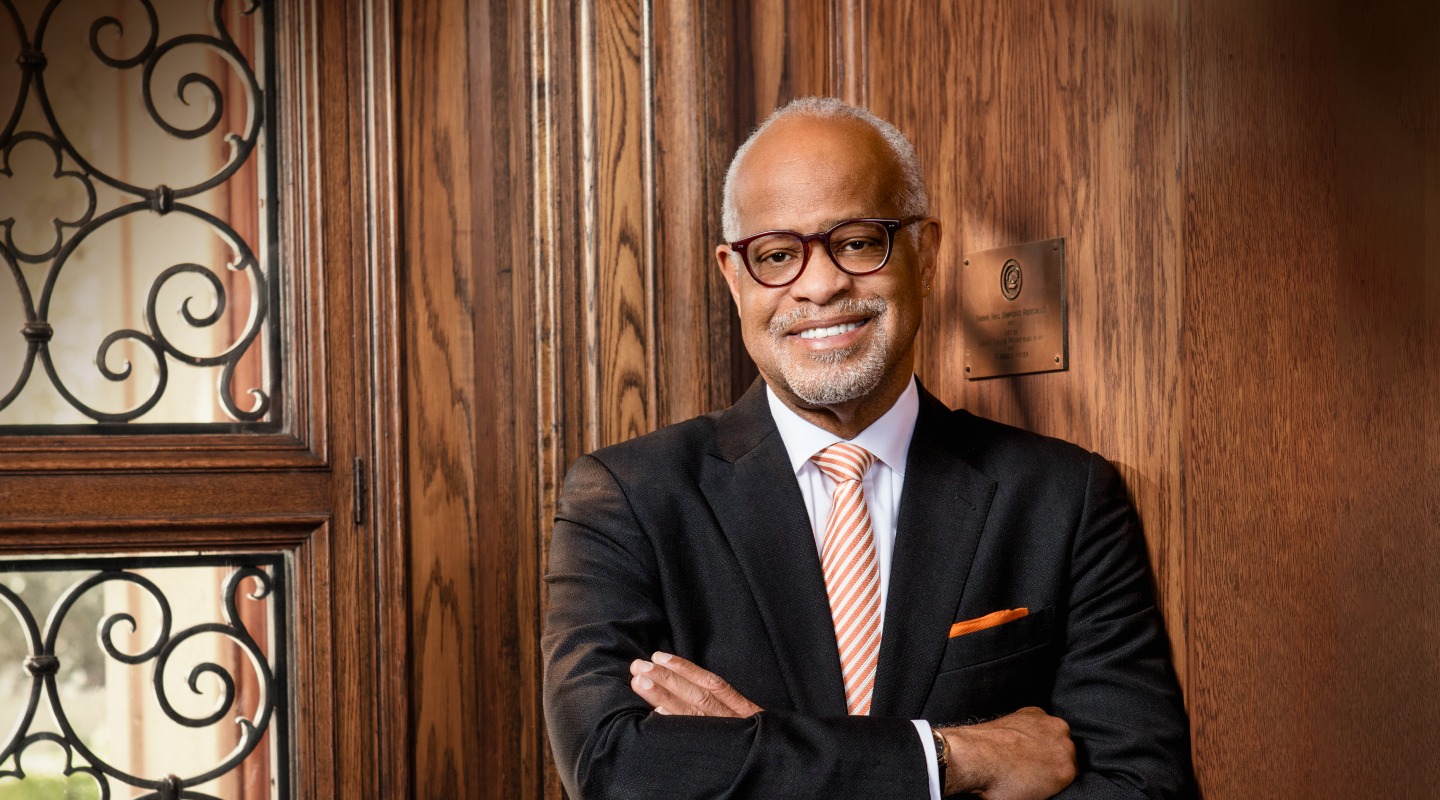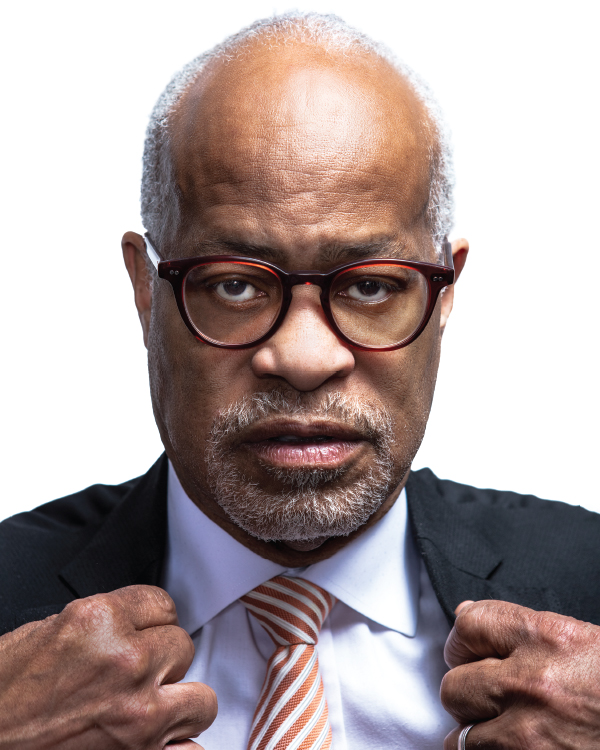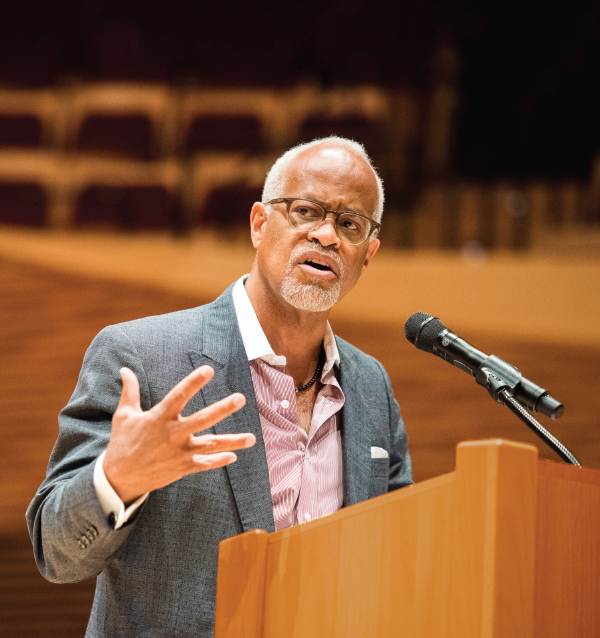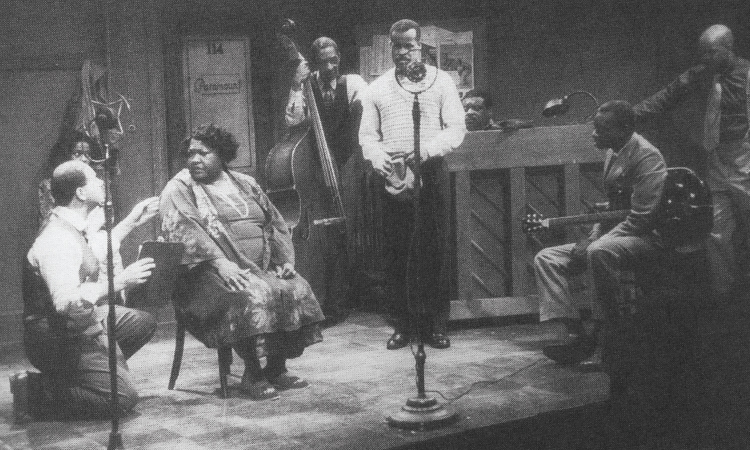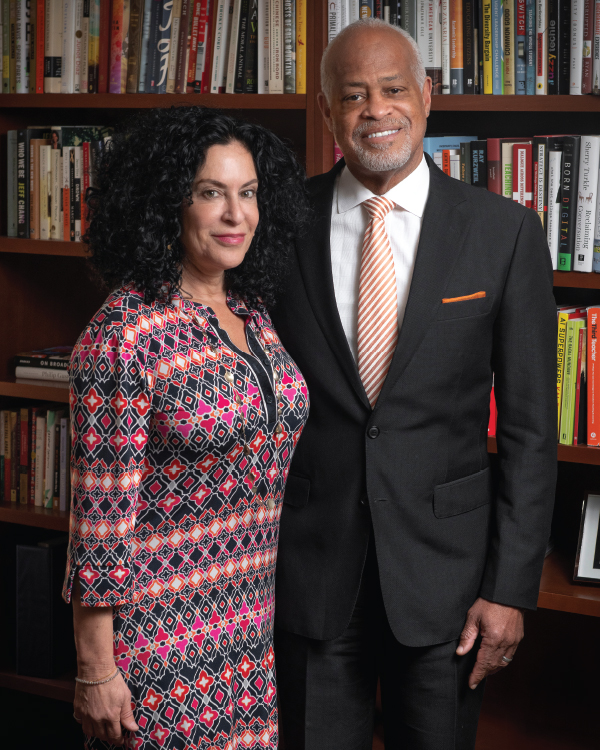Harry J. Elam, Jr. prepares to take center stage as Oxy’s 16th president as the College faces a new set of challenges—and he’s ready
There aren’t that many college or university presidents who come from a theater background—but if you think about the leadership attributes common to both jobs, you have to wonder: Why aren’t there more?
“My experiences of being a leader have been shaped by being a theater director,” says Harry J. Elam, Jr., who was named Occidental’s 16th president in February following a nationwide casting call. “Theater directors are sometimes thought of as autocrats, but I see them as collaborators. And my style of leadership has to be collaborative. What the theater director has to do is work to get the best performances out of all of the people involved. How do you incentivize people to do their best work?
“That’s what good leadership does, I think—make people feel part of the whole,” he continues. “That’s the designers, cast, and crew all feeling that their voice matters, like they’re working together toward a shared vision. And the show’s got to go on, right? So, that sense has shaped how I think about doing a project, or starting a strategic plan—but more than that, of working with people toward a cohesive, collective end.”
A member of the Stanford faculty since 1990, Elam is an award-winning professor of theater and performance studies, internationally renowned scholar, and a veteran senior administrator. As Stanford’s vice provost for undergraduate education for the last decade, Elam has been responsible for nearly all policies and programs relating to the university’s 7,200 undergraduate students.
Elam helped lead a major rethinking of Stanford’s undergraduate curriculum as well as a separate effort to create a new vision for the university’s student residences. A leader on issues of diversity and inclusion, he also created the Institute for Diversity in the Arts, initiated a summer bridge program for first-year students from under-resourced high schools, and designed a program to increase the number of students of color pursuing graduate degrees in STEM fields.
Elam has won the highest honors from the scholarly professional organizations in the fields of theater and drama—the Distinguished Scholar Award from the American Society of Theatre Research and the Career Achievement Award from the Association of Theater in Higher Education. In April 2006, he was inducted into the College of Fellows of the American Theatre. And last year, Elam was elected into the prestigious American Academy of Arts and Sciences, one of the nation’s oldest learned societies.
The Boston native emerged as the clear frontrunner out of an impressive field of candidates during a national search conducted by a 21-member search committee drawn from all segments of the College community.
“Harry has the proven leadership skills, profound understanding of undergraduate education, and enthusiastic embrace of our commitment to access and excellence that we were looking for,” says Steve Rountree ’71, chair of the Occidental Board of Trustees. “In addition to his academic credentials, Harry has a genuine ability to connect with people. He was the Board’s unanimous choice.”
“His lifelong commitment to promoting diversity and equity, supported by his scholarly pursuits in social justice, are a natural fit with Oxy’s own mission,” says John Lang, associate professor of sociology, Faculty Council president and search committee member. “Dr. Elam brings an openness, warmth, and collaborative approach that was evident throughout the search process.”
Student members of the search committee echoed Lang’s assessment. “Dr. Elam showed that he is comfortable relating to students on their level, regardless of background or identity,” says Dafna Erana ’20, a biology major from Los Angeles. “He is someone who has experience in community building and will consider the voices of his constituents when developing a way forward,” adds Alejo Maggini ’22, a diplomacy and world affairs and economics major from Argentina.
Following the news of his appointment as Jonathan Veitch’s successor—Elam officially begins his tenure July 1—response from the Oxy community was overwhelmingly positive on social media. “Excited to have Dr. Elam as the newest president of my beloved alma mater!” Jonathan Wenn ’96 M’01 wrote on Facebook. University of Delaware professor of English Gabrielle Foreman, who taught at the College from 1991 to 2011, tweeted, “I launched my career at Oxy, am in touch with hundreds of former students, and am over the moon with this selection. Congrats Oxy!”
“What’s been amazing is the reception by Oxy alumni in particular,” Elam says in early March during his first visit to the Occidental campus since the announcement. “I’ve heard from alumni across the country with warm welcomes. Somebody asked me if I had learned the Oxy yell [‘Io Triumphe’] yet.
“I still don’t know what that is,” he adds with a smile.
Elam is the second oldest of four children—two boys and two girls. His father, Judge Harry J. Elam Sr., became the first Black chief justice of the Boston Municipal Court in 1978, and retired in 1988 as associate justice of the Massachusetts Superior Court. (He died in 2012.) His mother, Barbara, was a librarian, children’s advocate, and lifelong community activist. (She died in 2017.)
“I think from them came that sense of a concern for others and a belief in the possibility that individuals can impact change,” says Elam. (In addition, his aunt, Harriet Elam-Thomas, enjoyed a four-decade career in the Foreign Service and was appointed by President Clinton as U.S. Ambassador to Senegal, serving from 2000 to 2002.)
In Harry Elam Sr.’s days as a lawyer, the one time he invited his family to the courtroom involved a case of police brutality where a Black man had been beaten by three white police officers. Elam was maybe 7 at the time, he recalls, “and I’m sure my father wanted us to see justice served. He had tons of witnesses to this case. He showed the man’s face, brutally beaten by the police, in a photo taken in the aftermath.”
As part of their defense, Elam continues, “The police officers brought in their torn uniforms and said that they, in fact, had been beaten up by this one man”—and the presiding judge hearing the case, Jerome P. Troy, sided with the officers. “I believed them,” the judge said, “because the cops don’t lie. I used to be a cop myself.” (Troy was disbarred and removed from the Dorchester District Court in November 1973 after being found guilty on six charges unrelated to the case, including lying under oath.)
The “devastating” verdict stuck with Elam, who recalls talking about it with his father years later. “It stays with me even now, this idea of how do we create or impact change? How can education contribute to thinking differently about the world? What needs to be in place for everyone to thrive and have a system of equity and access?”
Growing up, Elam shared a passion for performing with his younger brother, Keith, who achieved international renown as the rapper and producer known as Guru, one-half of the hip-hop duo Gang Starr. Back in 1993, when Guru played at Stanford in support of his album Jazzamatazz, Vol. 1, “I walked into the auditorium, and instead of saying, ‘That’s Professor Elam,’ some of the students were looking at me like, ‘That’s the Guru’s brother,’” he recalls fondly. (Keith died in 2010 from multiple myeloma, a form of blood cancer.)
“What I learned from him is the sense of how important it is to follow your dream,” Elam adds. When Keith dropped out of graduate school at the Fashion Institute of Technology “to do this rap thing,” he recalls, “As his older brother, I said to him, ‘What are you doing? This is crazy.’ But he made it work.”
As a high school student in Boston, Elam and his brother and their friends formed a Black youth theater group called the Family. “Some of the people in that group have been my friends for life and will be here at the inauguration,” he says. After enrolling at Harvard College as a social studies major, Elam continued to work with the Family, and he was vice president of the Harvard Black Community and Student Theater Group (Black CAST) as well.
“I always thought that I’d be a lawyer,” he says, “but by the time I got to my senior year, I realized that the only thing that excited me about being a lawyer was the drama of the courtroom—not a good reason to go to law school.” He was determined instead to go to UC Berkeley for graduate studies in dramatic arts and was “scared” to tell his father out of concerns over what he would think.
To his surprise, Elam says, “My father told me that the one thing he would’ve been if he wasn’t a lawyer or a judge was an actor. And he showed me pictures that I’d never seen before of him when he ran for city council in 1959.” Harry Elam Sr. had staged a musical that he wrote and produced to raise money for his campaign. (He didn’t win.)
“My older sister did go to law school because she wanted in a way to talk to my father, but what she really wanted to be was a writer,” Elam adds. (Patricia Elam-Walker is now a creative writing professor at Howard University and is working on her second novel.) “She used to write books for me when I was a kid, but they were always about a little brother who got beaten up or eaten up.”
Elam completed his doctorate in the dramatic arts at UC Berkeley in 1984. He has since written or co-edited seven books, and his scholarship has significantly impacted the study of contemporary American theater. His groundbreaking first book, Taking It to the Streets (1997), helped to inaugurate the field of comparative race studies as the first book to connect critically African-American and Chicano theater.
Elam is most closely associated with the work of August Wilson, the Pulitzer Prize-winning playwright whose 10-play opus, The Pittsburgh Cycle, examines the African-American experience in the 20th century, decade by decade. His second book, The Past as Present in the Drama of August Wilson, is considered a touchstone in Wilson criticism and was published in 2004, a year before the Pittsburgh native’s death from cancer at age 60.
“Wilson’s quote was, ‘I’ve lived a blessed life, I’m ready,’ which sounded like a character in his play Fences,” says Elam, whose book was awarded the Errol Hill Prize for outstanding scholarship in African-American theater and performance. He also has directed several of Wilson’s plays, including Radio Golf, Joe Turner’s Come and Gone, and Two Trains Running. A production of Fences directed by Elam won eight Bay Area “Choice” Awards.
The first time he met Wilson was when Elam was acting in a 1986 production of Ma Rainey’s Black Bottom at the Studio Theater in Washington, D.C., following the Tony Award-nominated play’s successful Broadway run. “That was my first contact with him,” he says, “and we had a big reception for him. You can imagine this room with tons of people and he was over in the corner, just observing.”
When Elam was writing his book on Wilson, he had the chance to meet with him again in 2001 in Los Angeles, and the two talked for 3½ hours outside the Mark Taper Forum (because Wilson chain-smoked, they couldn’t do the interview inside the theater). The experience “was incredible—that someone could be that giving,” he recalls. “He was an example of the kind of person I would want to be, in the theater or in life.”
Elam’s longtime interest in Wilson also led to his meeting his wife, Michele, who is now the William Robertson Coe Professor in the Humanities at Stanford and an associate director of the Institute for Human-Centered Artificial Intelligence.
Two decades ago, Elam was invited to the University of Puget Sound in Tacoma, Wash., to give a series of lectures on community theater and African American theater and performance. “So I went up there and the night before my first lecture was an August Wilson play, King Hedley II. And so I was at the theater and the guy who invited me said, ‘In addition to doing the lectures, we want you to teach this class on the Harlem Renaissance.’ And my mind is going, ‘They’re not paying me for more work,’” he recalls with a laugh.
“Then Michele walked up and said, ‘I’m the teacher of the Harlem Renaissance class.’ Immediately, I changed my mind and taught her class. For both of us, it was love at first sight.” The University of Puget Sound is about half the size of the Oxy campus, he says, and after her class, Michele, smitten, actually got lost walking Harry from her office to the English department.
“We talked for hours on the night before I left campus,” Elam says, “and I came back to visit the next week.”
After a long-distance courtship, the two were married in 2004 (Michele had joined the Stanford faculty a year earlier). “We’ve been partners in academia ever since,” Elam says. “When I write anything, my toughest, my most loving critic is Michele. I hear her voice when I’m writing sentences—and she says she hears mine in hers.”
The couple even taught a humanities class together for first-year students at Stanford from 2007 to 2010. “We share similar tastes, interests, and commitments and are close intellectual companions,” Michele told The Stanford Daily. They taught together because they are both interested in diversity, art, and politics. “Students quickly realized that we were married, and I guess this led to some entertainment value during class when we would appear to disagree.”
The Elams’ daughter, Claire Patterson, a 2016 Stanford graduate, lives and works in Los Angeles. Her parents plan to move into the Wallis Annenberg President’s House on the Occidental campus in July.
After 30 years at Stanford, Elam was ready for a new challenge—and he sees Oxy as a great fit. “As I think about it more, and listening to my wife, we both feel that way,” he says. “Certain things about Oxy stand out. One is its commitment to social justice and how that is manifested. Two is the ability to make what’s dynamic and democratic about the liberal arts work. I like what I saw in the Core curriculum, and I like the idea of comps.
“Oxy prides itself on being a distinctive urban liberal arts education. That urban part excites me,” Elam continues. “The possibilities for furthering the relationship with Los Angeles are exciting. This is a dynamic place and Oxy has so much to offer. In turn, the city has many things that it can offer Oxy—the relationship is best as reciprocal.”
As part of the search process, he says, “I took a tour of the campus incognito and I just loved it. The environment spoke to me and it felt like this is where I want to be. There’s still so much I’ve got to learn about Occidental, but everything I’ve seen and learned is so totally compelling.”
As vice provost of undergraduate education at Stanford, “In some ways I’ve been leading a liberal arts college within a research institution,” he says. “What I’ve been studying in a sense and thinking about is liberal arts education.” In coming to Oxy, “What better place is there to put those thoughts into practice and work with people who are fundamentally concerned about this issue?”
As he thinks about his top priorities coming in, step one is “meeting the community,” Elam says. He hopes to restore the tradition, begun under President Richard C. Gilman in 1965, of meeting every member of the incoming class during matriculation.
“Making those connections is really important,” he says. “I’d like to know all 2,100 students.” So he plans to meet students “on their terms—that’s in the residence halls, or in the MP, or by going to club meetings.”
On March 6 in Choi Auditorium, Elam surprised the members of Harambee, Oxy’s student group for Black men, by speaking to them briefly at their meeting and asking each member to introduce himself. The group greeted Elam with a standing ovation.
As far as Occidental’s faculty go, “I want to learn about their work and research as well as their plans for teaching,” he says. “One of the major things for any president to do is create an environment conducive to the best work of faculty.”
Elam served for a number of years on the Advisory Board at Stanford, which reviews the tenure, promotion, or appointment of every faculty member at the university. “I come from a place where there’s 2,200 faculty,” he adds. “I feel like I should know them all—and I can’t—but with 190 faculty at Occidental, I will.”
A third key constituency is Oxy’s alumni community—listening to what people say about Oxy and its aspirations for the future. “From all the input that I have, there’s a yearning among alumni to have contact with the College and with the president. How do we make space for that to happen? It’s going be a busy time.” (These days, there’s also the question of how soon: Plans to hold an alumni event in the Bay Area in May had to be scratched in the wake of the coronavirus.)
When Elam was introduced as Oxy’s next president in an email and accompanying video message on February 11, the world was a different place—and that’s not just hyperbole. That same day, with 43,000 confirmed cases worldwide of the novel coronavirus, the World Health Organization officially named the disease it causes “COVID-19.”
As his tenure winds down at Stanford, Elam has been on many calls about next steps for the university in the wake of COVID-19. “One of the things that I realize is that we’re not alone in this, and the questions that Stanford is facing are not unlike the ones Oxy is facing as well,” he says. At both institutions, “We need to do as much as possible to get out in front of these questions and be active rather than reactive.”
The pandemic has magnified the case of students in need—“first-gen students, low-income students, and students whose home situation may not be ideal,” he notes. “Now that they’ve had to either go home or find a space to work at home, it’s been challenging. James Uhrich [Occidental’s vice president for information technology services and chief information officer] told me about a student in Chicago whom he helped purchase computer equipment, over the phone, that she needed to do her work. Without that personal touch, this student would have been unable to keep up with her classes. So how we can even the playing field for our students is one of the key lessons of the pandemic.”
Has the coronavirus changed his thinking about his agenda for his first 100 days on the job? “In some ways those first 100 days have started,” says Elam, who addressed the Oxy faculty as a group for the first time in a Zoom meeting in mid-April. “Right now I’m working with Oxy’s very strong executive team to learn as much as I can, so that I’m informed about the decisions that need to be made for fall.”
Elam will begin his term some 14 months after the College launched the public phase of The Oxy Campaign For Good, which has raised more than $155 million toward its goal of $225 million. “What I really like about the campaign is that it’s about fundamentals—scholarships and professorships,” he says. “The notion of a campaign for good speaks to Oxy’s values.”
In the face of COVID-19, he adds, “Trying to run a campaign when people are feeling the loss economically, socially, and culturally will be challenging. I still want to meet Occidental’s important donors and the community, but it won’t be with the end of thinking immediately about how we are going to grow the campaign—but rather how we are going to be sensitive to the community’s needs.”
August Wilson once said, “I was born to a time of fire.” Coming of age in the 1960s, Elam explains, “There was a fire around our revolutionary change of Black Power, and Wilson was politically active at that time. His father was a white German banker, but Wilson felt his primary allegiance was to his mother’s African-American roots. So the idea of art and its connection to politics was something he believed in deeply.”
Is it a time of fire for higher education? “The simple answer is yes,” Elam says. “For Occidental, the challenge is how do we come out of this trial? How do we position ourselves not only to survive but to thrive?
“This is a difficult time, but we are committed across the board to keeping Occidental’s values, vision, and mission alive,” he continues. “All of us are working together to create a ‘new normal,’ building on the past, defining what we need to do in this present, and imagining fresh futures.”

